Charles Sturt University: Self-Driving Car Ethics and Ethical Theories
VerifiedAdded on 2021/06/17
|7
|1623
|29
Report
AI Summary
This report, submitted by a student, analyzes the ethical implications of self-driving car crashes in Australia. It applies four key ethical theories: utilitarianism, deontology, virtue theory, and contract theory, to evaluate judgments regarding the use of autonomous vehicles. The analysis considers the potential benefits and harms of self-driving cars, examining the perspectives of various stakeholders. The report explores how each ethical theory can be used to assess the moral and ethical considerations, individual strengths, and applicable rules in the context of self-driving car crashes. It concludes by emphasizing the importance of using these theories to inform judgments about the future of autonomous vehicle technology in Australia, particularly in the context of the Google self-driving car case. The report uses these theories to evaluate the impact of self-driving cars on society. The analysis covers areas such as ethical concerns, individual character, and legal frameworks to determine whether self-driving cars should be permitted or restricted in Australia. This report is available on Desklib, a platform offering AI-based study tools for students.
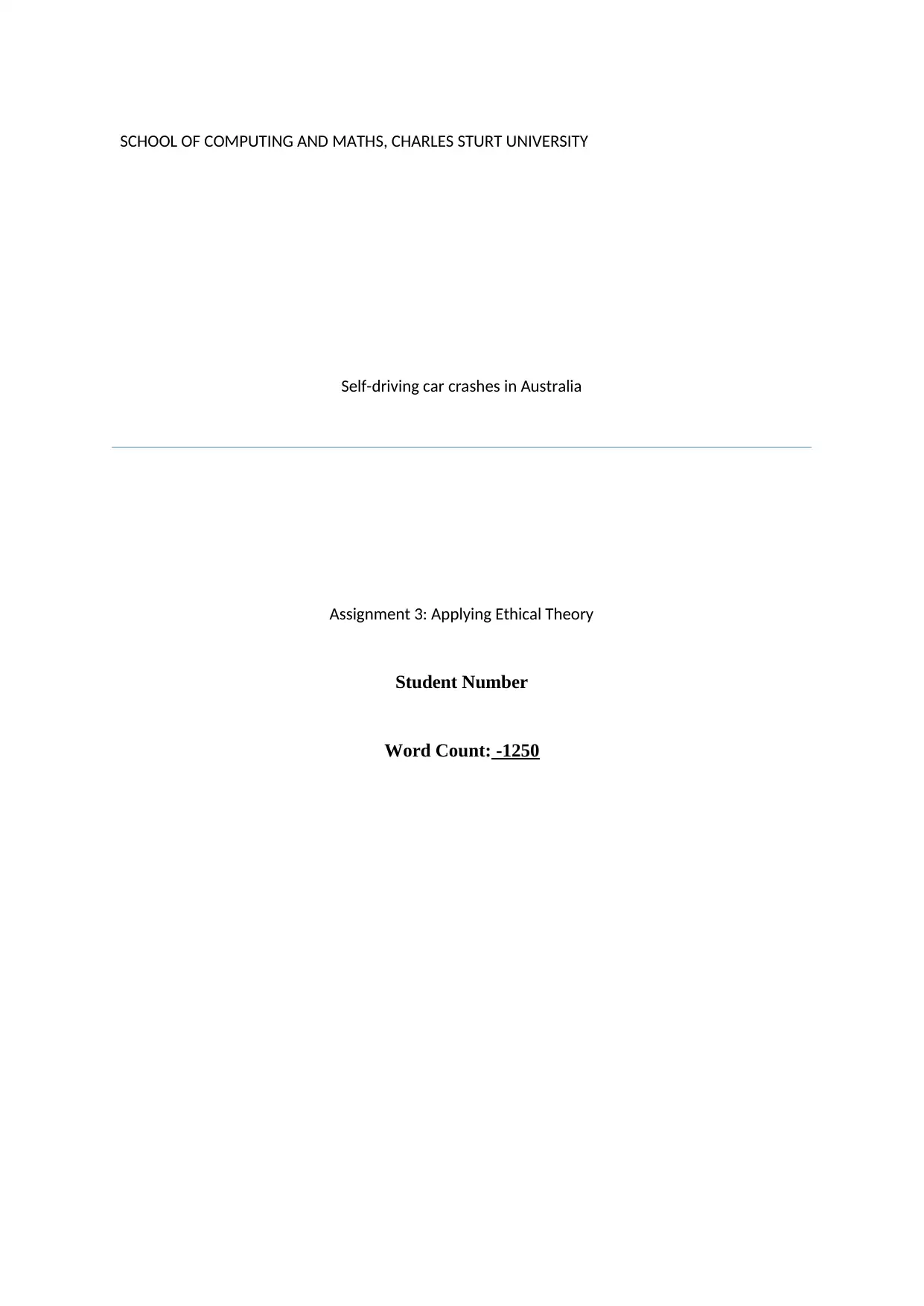
SCHOOL OF COMPUTING AND MATHS, CHARLES STURT UNIVERSITY
Self-driving car crashes in Australia
Assignment 3: Applying Ethical Theory
Student Number
Word Count: -1250
Self-driving car crashes in Australia
Assignment 3: Applying Ethical Theory
Student Number
Word Count: -1250
Paraphrase This Document
Need a fresh take? Get an instant paraphrase of this document with our AI Paraphraser
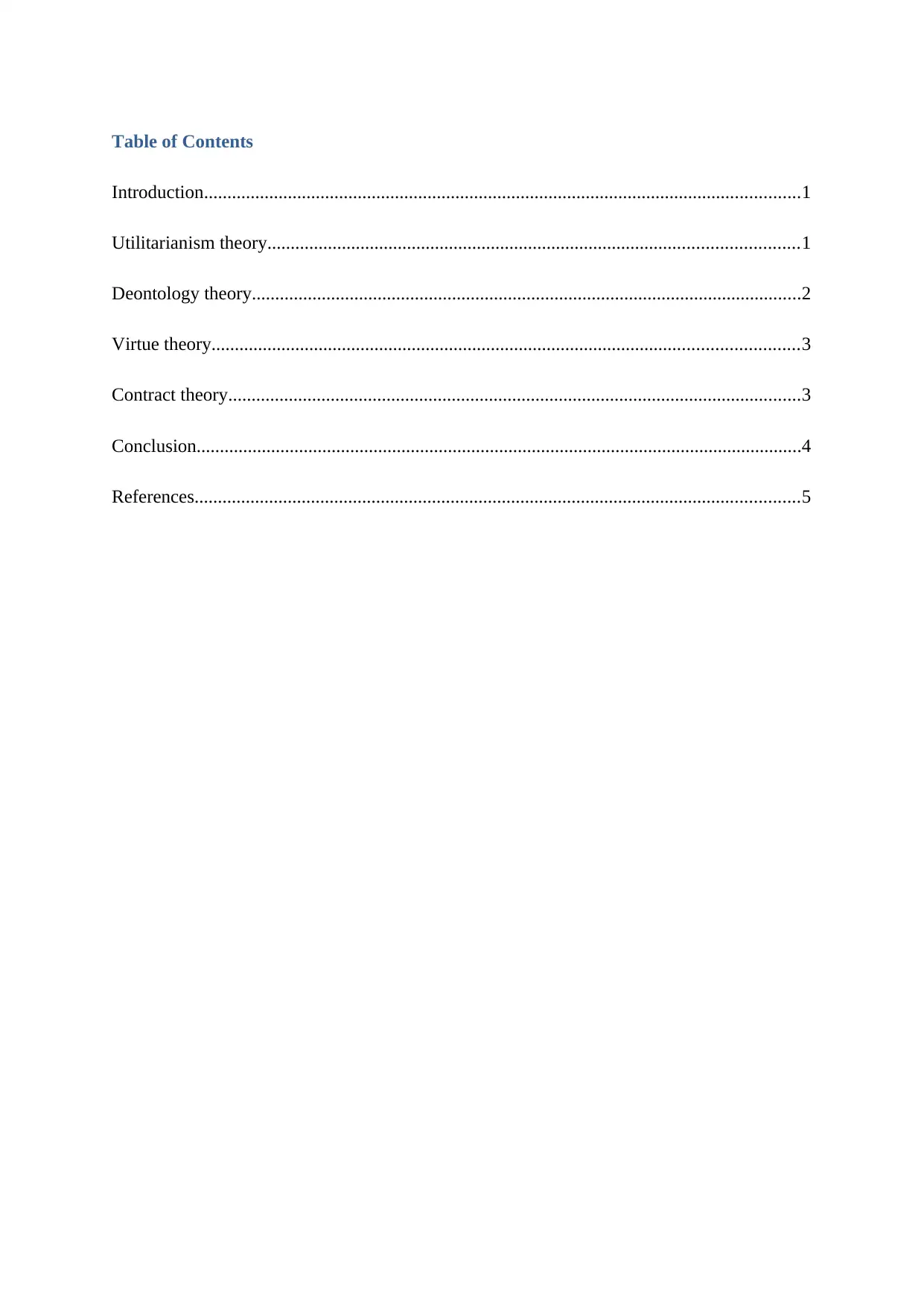
Table of Contents
Introduction................................................................................................................................1
Utilitarianism theory..................................................................................................................1
Deontology theory......................................................................................................................2
Virtue theory..............................................................................................................................3
Contract theory...........................................................................................................................3
Conclusion..................................................................................................................................4
References..................................................................................................................................5
Introduction................................................................................................................................1
Utilitarianism theory..................................................................................................................1
Deontology theory......................................................................................................................2
Virtue theory..............................................................................................................................3
Contract theory...........................................................................................................................3
Conclusion..................................................................................................................................4
References..................................................................................................................................5
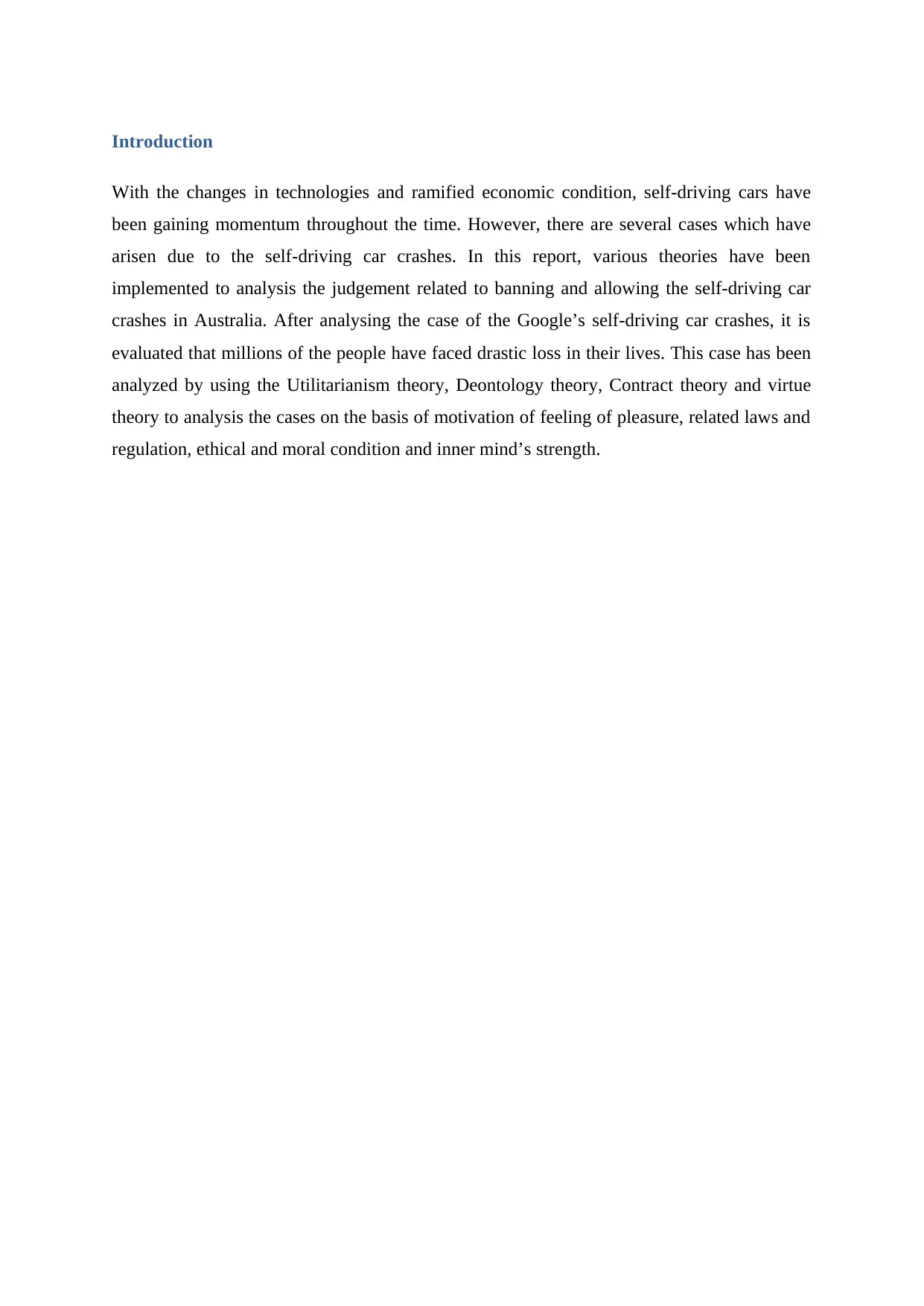
Introduction
With the changes in technologies and ramified economic condition, self-driving cars have
been gaining momentum throughout the time. However, there are several cases which have
arisen due to the self-driving car crashes. In this report, various theories have been
implemented to analysis the judgement related to banning and allowing the self-driving car
crashes in Australia. After analysing the case of the Google’s self-driving car crashes, it is
evaluated that millions of the people have faced drastic loss in their lives. This case has been
analyzed by using the Utilitarianism theory, Deontology theory, Contract theory and virtue
theory to analysis the cases on the basis of motivation of feeling of pleasure, related laws and
regulation, ethical and moral condition and inner mind’s strength.
With the changes in technologies and ramified economic condition, self-driving cars have
been gaining momentum throughout the time. However, there are several cases which have
arisen due to the self-driving car crashes. In this report, various theories have been
implemented to analysis the judgement related to banning and allowing the self-driving car
crashes in Australia. After analysing the case of the Google’s self-driving car crashes, it is
evaluated that millions of the people have faced drastic loss in their lives. This case has been
analyzed by using the Utilitarianism theory, Deontology theory, Contract theory and virtue
theory to analysis the cases on the basis of motivation of feeling of pleasure, related laws and
regulation, ethical and moral condition and inner mind’s strength.
⊘ This is a preview!⊘
Do you want full access?
Subscribe today to unlock all pages.

Trusted by 1+ million students worldwide
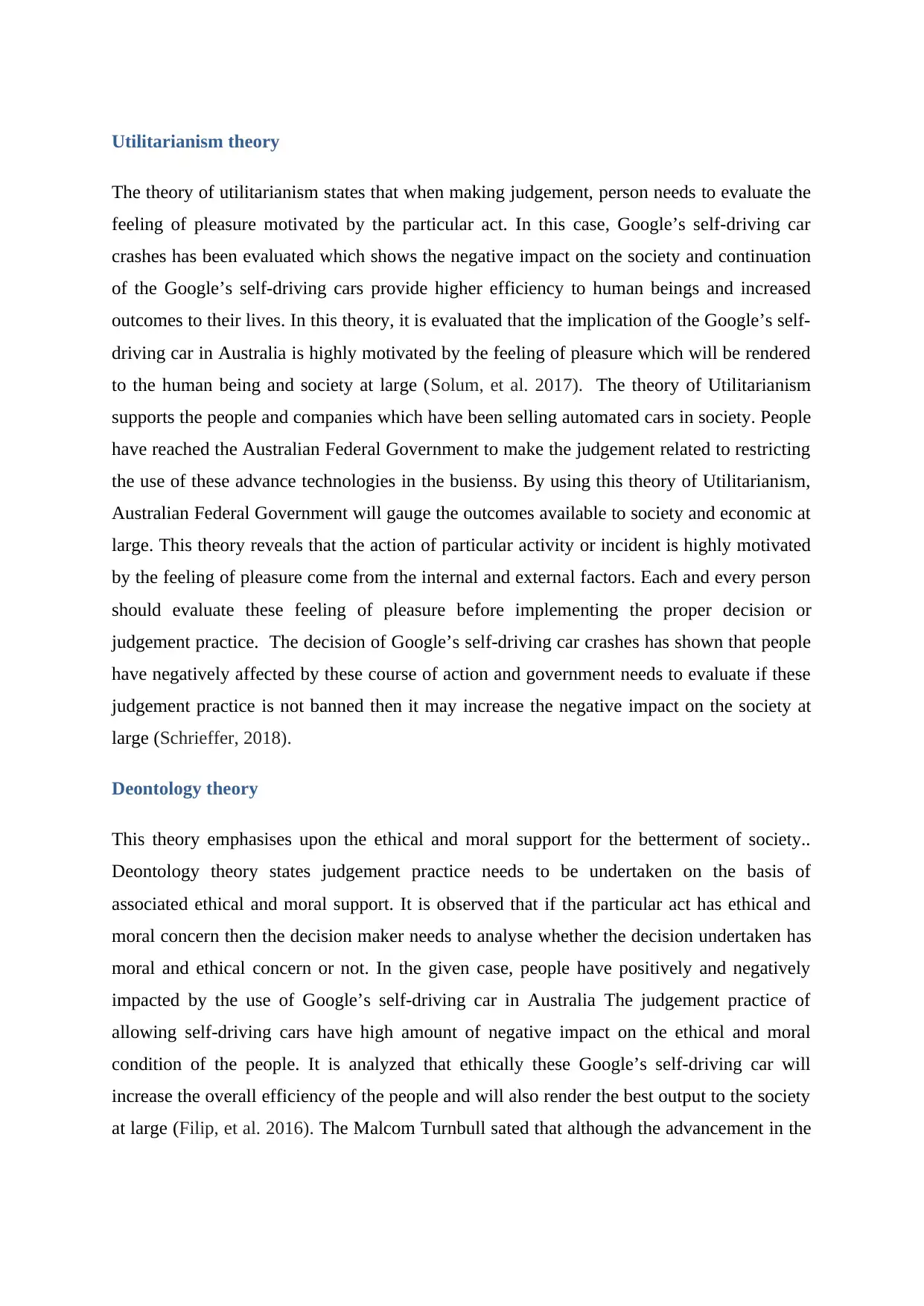
Utilitarianism theory
The theory of utilitarianism states that when making judgement, person needs to evaluate the
feeling of pleasure motivated by the particular act. In this case, Google’s self-driving car
crashes has been evaluated which shows the negative impact on the society and continuation
of the Google’s self-driving cars provide higher efficiency to human beings and increased
outcomes to their lives. In this theory, it is evaluated that the implication of the Google’s self-
driving car in Australia is highly motivated by the feeling of pleasure which will be rendered
to the human being and society at large (Solum, et al. 2017). The theory of Utilitarianism
supports the people and companies which have been selling automated cars in society. People
have reached the Australian Federal Government to make the judgement related to restricting
the use of these advance technologies in the busienss. By using this theory of Utilitarianism,
Australian Federal Government will gauge the outcomes available to society and economic at
large. This theory reveals that the action of particular activity or incident is highly motivated
by the feeling of pleasure come from the internal and external factors. Each and every person
should evaluate these feeling of pleasure before implementing the proper decision or
judgement practice. The decision of Google’s self-driving car crashes has shown that people
have negatively affected by these course of action and government needs to evaluate if these
judgement practice is not banned then it may increase the negative impact on the society at
large (Schrieffer, 2018).
Deontology theory
This theory emphasises upon the ethical and moral support for the betterment of society..
Deontology theory states judgement practice needs to be undertaken on the basis of
associated ethical and moral support. It is observed that if the particular act has ethical and
moral concern then the decision maker needs to analyse whether the decision undertaken has
moral and ethical concern or not. In the given case, people have positively and negatively
impacted by the use of Google’s self-driving car in Australia The judgement practice of
allowing self-driving cars have high amount of negative impact on the ethical and moral
condition of the people. It is analyzed that ethically these Google’s self-driving car will
increase the overall efficiency of the people and will also render the best output to the society
at large (Filip, et al. 2016). The Malcom Turnbull sated that although the advancement in the
The theory of utilitarianism states that when making judgement, person needs to evaluate the
feeling of pleasure motivated by the particular act. In this case, Google’s self-driving car
crashes has been evaluated which shows the negative impact on the society and continuation
of the Google’s self-driving cars provide higher efficiency to human beings and increased
outcomes to their lives. In this theory, it is evaluated that the implication of the Google’s self-
driving car in Australia is highly motivated by the feeling of pleasure which will be rendered
to the human being and society at large (Solum, et al. 2017). The theory of Utilitarianism
supports the people and companies which have been selling automated cars in society. People
have reached the Australian Federal Government to make the judgement related to restricting
the use of these advance technologies in the busienss. By using this theory of Utilitarianism,
Australian Federal Government will gauge the outcomes available to society and economic at
large. This theory reveals that the action of particular activity or incident is highly motivated
by the feeling of pleasure come from the internal and external factors. Each and every person
should evaluate these feeling of pleasure before implementing the proper decision or
judgement practice. The decision of Google’s self-driving car crashes has shown that people
have negatively affected by these course of action and government needs to evaluate if these
judgement practice is not banned then it may increase the negative impact on the society at
large (Schrieffer, 2018).
Deontology theory
This theory emphasises upon the ethical and moral support for the betterment of society..
Deontology theory states judgement practice needs to be undertaken on the basis of
associated ethical and moral support. It is observed that if the particular act has ethical and
moral concern then the decision maker needs to analyse whether the decision undertaken has
moral and ethical concern or not. In the given case, people have positively and negatively
impacted by the use of Google’s self-driving car in Australia The judgement practice of
allowing self-driving cars have high amount of negative impact on the ethical and moral
condition of the people. It is analyzed that ethically these Google’s self-driving car will
increase the overall efficiency of the people and will also render the best output to the society
at large (Filip, et al. 2016). The Malcom Turnbull sated that although the advancement in the
Paraphrase This Document
Need a fresh take? Get an instant paraphrase of this document with our AI Paraphraser
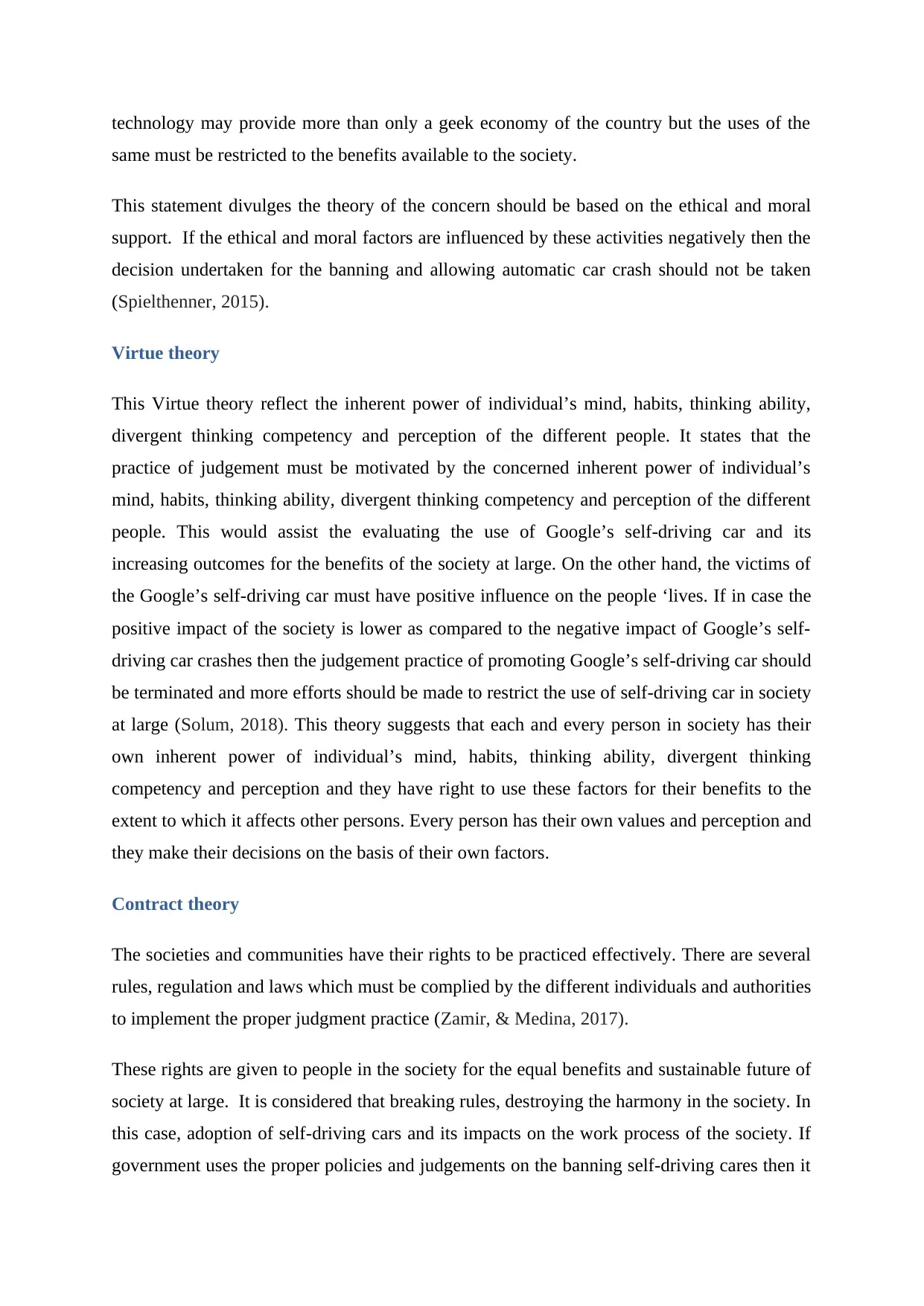
technology may provide more than only a geek economy of the country but the uses of the
same must be restricted to the benefits available to the society.
This statement divulges the theory of the concern should be based on the ethical and moral
support. If the ethical and moral factors are influenced by these activities negatively then the
decision undertaken for the banning and allowing automatic car crash should not be taken
(Spielthenner, 2015).
Virtue theory
This Virtue theory reflect the inherent power of individual’s mind, habits, thinking ability,
divergent thinking competency and perception of the different people. It states that the
practice of judgement must be motivated by the concerned inherent power of individual’s
mind, habits, thinking ability, divergent thinking competency and perception of the different
people. This would assist the evaluating the use of Google’s self-driving car and its
increasing outcomes for the benefits of the society at large. On the other hand, the victims of
the Google’s self-driving car must have positive influence on the people ‘lives. If in case the
positive impact of the society is lower as compared to the negative impact of Google’s self-
driving car crashes then the judgement practice of promoting Google’s self-driving car should
be terminated and more efforts should be made to restrict the use of self-driving car in society
at large (Solum, 2018). This theory suggests that each and every person in society has their
own inherent power of individual’s mind, habits, thinking ability, divergent thinking
competency and perception and they have right to use these factors for their benefits to the
extent to which it affects other persons. Every person has their own values and perception and
they make their decisions on the basis of their own factors.
Contract theory
The societies and communities have their rights to be practiced effectively. There are several
rules, regulation and laws which must be complied by the different individuals and authorities
to implement the proper judgment practice (Zamir, & Medina, 2017).
These rights are given to people in the society for the equal benefits and sustainable future of
society at large. It is considered that breaking rules, destroying the harmony in the society. In
this case, adoption of self-driving cars and its impacts on the work process of the society. If
government uses the proper policies and judgements on the banning self-driving cares then it
same must be restricted to the benefits available to the society.
This statement divulges the theory of the concern should be based on the ethical and moral
support. If the ethical and moral factors are influenced by these activities negatively then the
decision undertaken for the banning and allowing automatic car crash should not be taken
(Spielthenner, 2015).
Virtue theory
This Virtue theory reflect the inherent power of individual’s mind, habits, thinking ability,
divergent thinking competency and perception of the different people. It states that the
practice of judgement must be motivated by the concerned inherent power of individual’s
mind, habits, thinking ability, divergent thinking competency and perception of the different
people. This would assist the evaluating the use of Google’s self-driving car and its
increasing outcomes for the benefits of the society at large. On the other hand, the victims of
the Google’s self-driving car must have positive influence on the people ‘lives. If in case the
positive impact of the society is lower as compared to the negative impact of Google’s self-
driving car crashes then the judgement practice of promoting Google’s self-driving car should
be terminated and more efforts should be made to restrict the use of self-driving car in society
at large (Solum, 2018). This theory suggests that each and every person in society has their
own inherent power of individual’s mind, habits, thinking ability, divergent thinking
competency and perception and they have right to use these factors for their benefits to the
extent to which it affects other persons. Every person has their own values and perception and
they make their decisions on the basis of their own factors.
Contract theory
The societies and communities have their rights to be practiced effectively. There are several
rules, regulation and laws which must be complied by the different individuals and authorities
to implement the proper judgment practice (Zamir, & Medina, 2017).
These rights are given to people in the society for the equal benefits and sustainable future of
society at large. It is considered that breaking rules, destroying the harmony in the society. In
this case, adoption of self-driving cars and its impacts on the work process of the society. If
government uses the proper policies and judgements on the banning self-driving cares then it
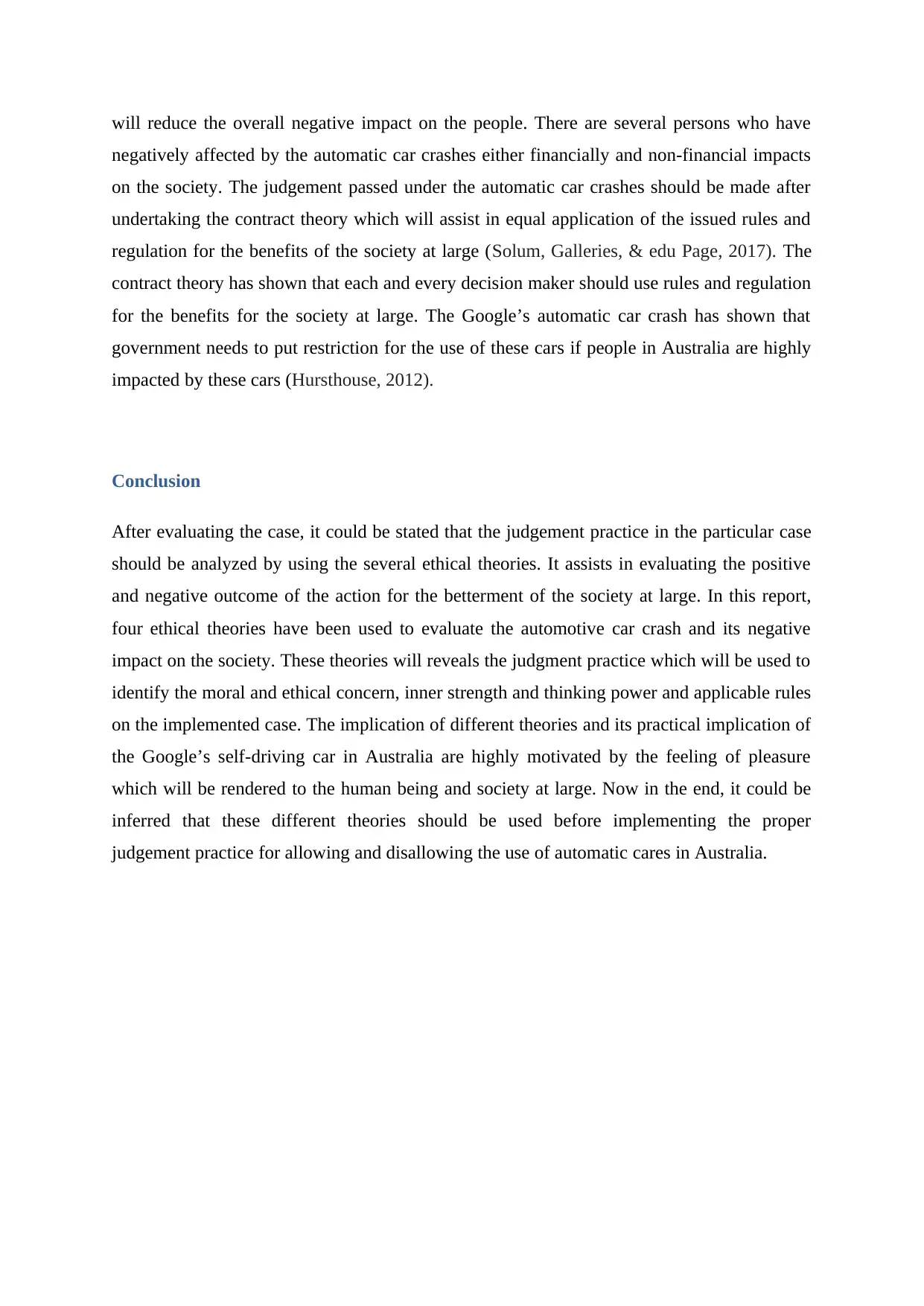
will reduce the overall negative impact on the people. There are several persons who have
negatively affected by the automatic car crashes either financially and non-financial impacts
on the society. The judgement passed under the automatic car crashes should be made after
undertaking the contract theory which will assist in equal application of the issued rules and
regulation for the benefits of the society at large (Solum, Galleries, & edu Page, 2017). The
contract theory has shown that each and every decision maker should use rules and regulation
for the benefits for the society at large. The Google’s automatic car crash has shown that
government needs to put restriction for the use of these cars if people in Australia are highly
impacted by these cars (Hursthouse, 2012).
Conclusion
After evaluating the case, it could be stated that the judgement practice in the particular case
should be analyzed by using the several ethical theories. It assists in evaluating the positive
and negative outcome of the action for the betterment of the society at large. In this report,
four ethical theories have been used to evaluate the automotive car crash and its negative
impact on the society. These theories will reveals the judgment practice which will be used to
identify the moral and ethical concern, inner strength and thinking power and applicable rules
on the implemented case. The implication of different theories and its practical implication of
the Google’s self-driving car in Australia are highly motivated by the feeling of pleasure
which will be rendered to the human being and society at large. Now in the end, it could be
inferred that these different theories should be used before implementing the proper
judgement practice for allowing and disallowing the use of automatic cares in Australia.
negatively affected by the automatic car crashes either financially and non-financial impacts
on the society. The judgement passed under the automatic car crashes should be made after
undertaking the contract theory which will assist in equal application of the issued rules and
regulation for the benefits of the society at large (Solum, Galleries, & edu Page, 2017). The
contract theory has shown that each and every decision maker should use rules and regulation
for the benefits for the society at large. The Google’s automatic car crash has shown that
government needs to put restriction for the use of these cars if people in Australia are highly
impacted by these cars (Hursthouse, 2012).
Conclusion
After evaluating the case, it could be stated that the judgement practice in the particular case
should be analyzed by using the several ethical theories. It assists in evaluating the positive
and negative outcome of the action for the betterment of the society at large. In this report,
four ethical theories have been used to evaluate the automotive car crash and its negative
impact on the society. These theories will reveals the judgment practice which will be used to
identify the moral and ethical concern, inner strength and thinking power and applicable rules
on the implemented case. The implication of different theories and its practical implication of
the Google’s self-driving car in Australia are highly motivated by the feeling of pleasure
which will be rendered to the human being and society at large. Now in the end, it could be
inferred that these different theories should be used before implementing the proper
judgement practice for allowing and disallowing the use of automatic cares in Australia.
⊘ This is a preview!⊘
Do you want full access?
Subscribe today to unlock all pages.

Trusted by 1+ million students worldwide
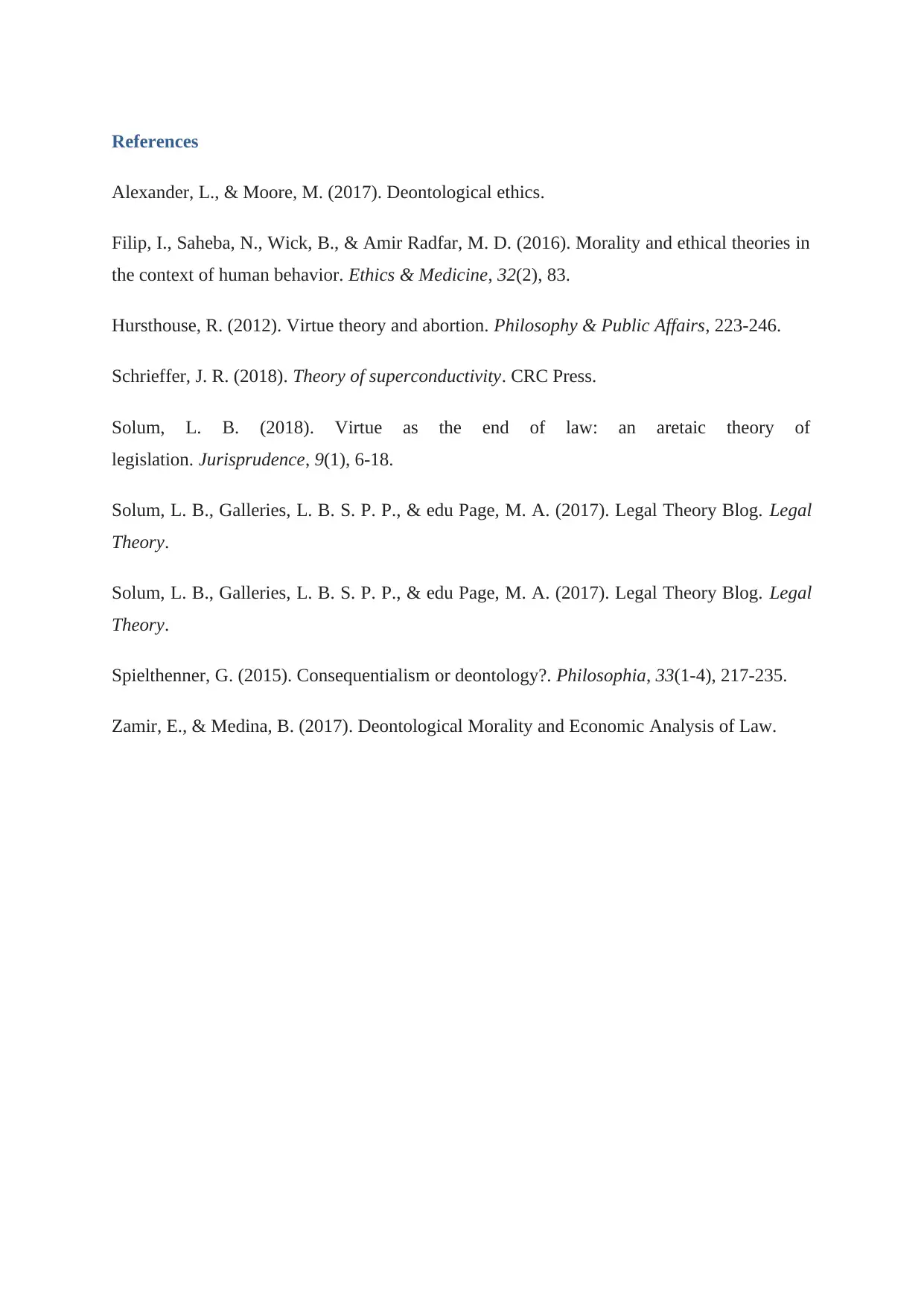
References
Alexander, L., & Moore, M. (2017). Deontological ethics.
Filip, I., Saheba, N., Wick, B., & Amir Radfar, M. D. (2016). Morality and ethical theories in
the context of human behavior. Ethics & Medicine, 32(2), 83.
Hursthouse, R. (2012). Virtue theory and abortion. Philosophy & Public Affairs, 223-246.
Schrieffer, J. R. (2018). Theory of superconductivity. CRC Press.
Solum, L. B. (2018). Virtue as the end of law: an aretaic theory of
legislation. Jurisprudence, 9(1), 6-18.
Solum, L. B., Galleries, L. B. S. P. P., & edu Page, M. A. (2017). Legal Theory Blog. Legal
Theory.
Solum, L. B., Galleries, L. B. S. P. P., & edu Page, M. A. (2017). Legal Theory Blog. Legal
Theory.
Spielthenner, G. (2015). Consequentialism or deontology?. Philosophia, 33(1-4), 217-235.
Zamir, E., & Medina, B. (2017). Deontological Morality and Economic Analysis of Law.
Alexander, L., & Moore, M. (2017). Deontological ethics.
Filip, I., Saheba, N., Wick, B., & Amir Radfar, M. D. (2016). Morality and ethical theories in
the context of human behavior. Ethics & Medicine, 32(2), 83.
Hursthouse, R. (2012). Virtue theory and abortion. Philosophy & Public Affairs, 223-246.
Schrieffer, J. R. (2018). Theory of superconductivity. CRC Press.
Solum, L. B. (2018). Virtue as the end of law: an aretaic theory of
legislation. Jurisprudence, 9(1), 6-18.
Solum, L. B., Galleries, L. B. S. P. P., & edu Page, M. A. (2017). Legal Theory Blog. Legal
Theory.
Solum, L. B., Galleries, L. B. S. P. P., & edu Page, M. A. (2017). Legal Theory Blog. Legal
Theory.
Spielthenner, G. (2015). Consequentialism or deontology?. Philosophia, 33(1-4), 217-235.
Zamir, E., & Medina, B. (2017). Deontological Morality and Economic Analysis of Law.
1 out of 7
Related Documents
Your All-in-One AI-Powered Toolkit for Academic Success.
+13062052269
info@desklib.com
Available 24*7 on WhatsApp / Email
![[object Object]](/_next/static/media/star-bottom.7253800d.svg)
Unlock your academic potential
Copyright © 2020–2026 A2Z Services. All Rights Reserved. Developed and managed by ZUCOL.





